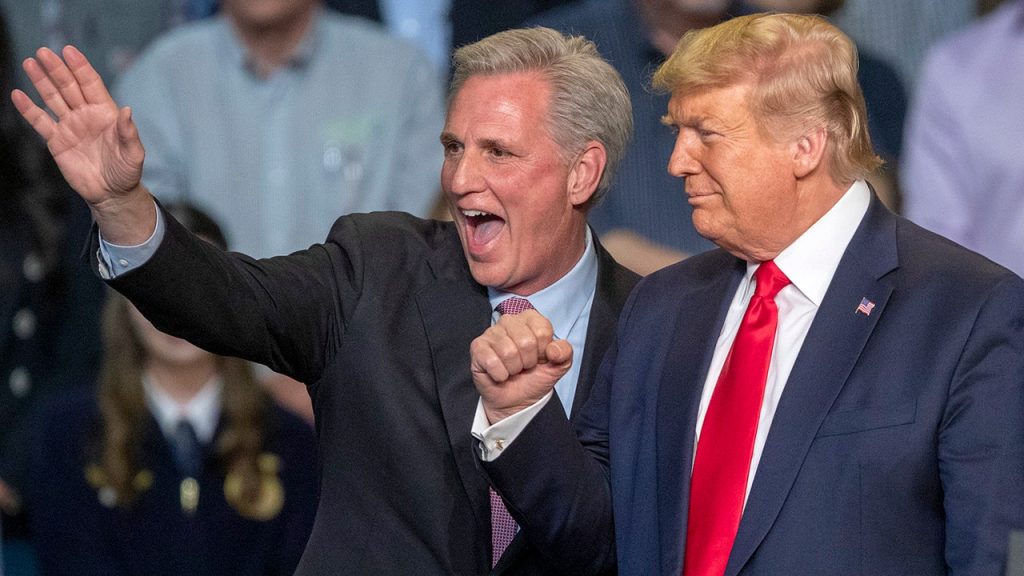Former President Donald Trump has ignited a political firestorm with his critique of the 2023 debt ceiling suspension, a deal orchestrated by then-House Speaker Kevin McCarthy. Trump lambasted the agreement as “one of the dumbest political decisions made in years,” arguing that it needlessly ceded leverage to the Biden administration and ultimately contributed to McCarthy’s ouster from the speakership. While acknowledging McCarthy as a “good man and a friend,” Trump maintained that the decision to suspend the debt ceiling until January 2025 was a strategic blunder, offering no tangible gains for Republicans while transferring the onus of addressing the issue to a future Trump administration. Trump’s condemnation centers on the belief that the debt ceiling represents a powerful negotiating tool that Republicans should wield against the Democrats, forcing them to confront difficult spending choices and potentially exposing their fiscal priorities to public scrutiny.
Trump’s discontent with the debt ceiling suspension reflects a broader strategic concern within the Republican party about ceding ground to the Democrats on fiscal matters. He contends that by delaying the debt ceiling debate until 2025, Republicans effectively handed the Democrats a political weapon, allowing them to potentially manufacture a fiscal crisis during a Trump presidency and blame Republicans for the ensuing economic fallout. Trump envisions a scenario where the Democrats, unburdened by the immediate pressure of the debt ceiling, could engage in unrestrained spending and then exploit the looming crisis to pressure Republicans into accepting unfavorable compromises. This, he argues, would allow the Democrats to paint Republicans as fiscally irresponsible and obstruct the Trump administration’s agenda.
Adding fuel to the fire, Trump invoked the specter of the 1929 Great Depression, warning that the Democrats would be willing to risk a similar economic catastrophe if it meant damaging the Republican Party. He urged Congress to force a vote on the debt ceiling issue immediately, placing the responsibility squarely on the Biden administration and exposing what he perceives as the Democrats’ reckless disregard for fiscal prudence. This call for immediate action underscores Trump’s belief that the debt ceiling should be used proactively as a bargaining chip to extract concessions from the Democrats, rather than reactively as a means to avert a crisis.
Treasury Secretary Janet Yellen has confirmed the timeline for the impending debt ceiling showdown, projecting that the current suspension will expire between January 14 and January 23, 2025. At that point, the Treasury Department will be forced to implement “extraordinary measures” to avoid defaulting on the nation’s debt obligations. Yellen’s warning underscores the urgency of the situation and the potential for a significant economic disruption if Congress fails to act. Her plea for congressional action serves as a stark reminder of the looming fiscal cliff and the potential consequences of political inaction.
Trump’s preemptive call for raising the debt ceiling earlier this month, jointly issued with Vice President-elect JD Vance, further highlights his strategic concerns. They argued that addressing the debt ceiling under the Biden administration would be preferable to confronting the issue during a Trump presidency, anticipating that Democratic cooperation would be less forthcoming in the latter scenario. This preemptive maneuver reflects a calculated attempt to avoid a potential political trap, whereby Democrats could leverage the debt ceiling to extract concessions or obstruct the Trump administration’s agenda. Their failed attempt to incorporate a debt ceiling increase into a stopgap government spending proposal underscores the political complexities surrounding this issue and the difficulty of achieving bipartisan consensus.
The ensuing debate has exposed divisions within the Republican Party. Rep. Chip Roy of Texas, a prominent member of the House Freedom Caucus, pointed out that a significant number of House Republicans opposed the 2023 debt ceiling suspension. Roy suggested that the debt ceiling could be addressed through budget reconciliation in January, requiring a simple majority vote in the Senate and potentially bypassing Democratic opposition. However, this approach would likely necessitate significant spending cuts, a politically challenging proposition that could trigger further intra-party conflict and potentially a government shutdown. Roy’s remarks highlight the ongoing debate within the Republican Party about the best strategy for addressing the debt ceiling and balancing fiscal responsibility with political expediency.

